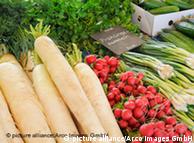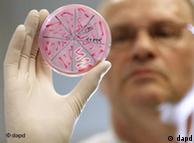Germany sees a sharp upswing in dangerous intestinal infections
May brought a mysterious rise in cases of a dangerous ailment caused by
EHEC bacteria. Health officials are scrambling to find the source of the
often foodborne disease, which has caused at least one death this
month.
German health
authorities have registered over 400 confirmed or suspected cases of a
rare and potentially lethal bacterial disease since mid May. The reports
represent a dramatic rise in comparison with the last ten years, in
which 800 to 1,200 cases occurred annually.
The condition is
caused by a strain of the bacterium E. coli - enterohemorrhagic E. coli
(EHEC) - which is often foodborne and can lead to severe digestive
problems.
"The first symptom is diarrhea, and, in more severe
cases, this is typically followed by blood in the stool and massive
cramping," said Reinhard Burger in an interview with Deutsche Welle.
Burger is President of Germany's Robert Koch Institute, a federal
institution tasked with disease control and prevention.
While an
average case runs its course in around a week, acute instances of the
ailment can lead to kidney failure and even death. Symptoms generally
take several days to show up after individuals come in contact with the
EHEC bacteria.
Both the rash of reports and the severity of the outbreaks in May has alarmed public health officials.
"This
epidemic is really very unusual, because in a normal year, we only see
about 10 cases in Hamburg," Rico Schmidt of Hamburg's Department of
Health told Deutsche Welle.
In May, Hamburg has already registered over 40 cases of the more severe form of illness brought on by EHEC.
 A public health body in Hamburg said vegetables may be carrying the bacteriaSource still unknown A public health body in Hamburg said vegetables may be carrying the bacteriaSource still unknown
Health officials
and scientists are working hard to isolate what is causing this year's
outbreaks while advising customers to exercise extra caution in
selecting and cleaning the foods they consume.
"Since the source
of the infections hasn't yet been discovered, that means we also can't
put a stop to it - instead, we have to get warnings out to people," said
Dr. Susanne Huggett, Medical Director at the MEDILYS laboratory in
Hamburg, in an interview with Deutsche Welle.
Hamburg's Institute for
Hygiene and Environment said unwashed vegetables could be the prime
suspect based on information gathered from afflicted individuals, while
sources like raw milk, cream cheese and beef that more often contain the
bacteria seem unlikely to have caused the current epidemic.
"If fields are
fertilized with liquid manure, then the EHEC bacteria can make its way
on to salad or vegetables sold in supermarkets," noted Werner Solbach,
microbiologist at the University of Lübeck, in an interview with
Deutsche Welle. "These days, we have a lot of pre-packaged and prepared
salads for sale that may contain the bacteria."
Although generally
children and the elderly are most at risk of infection, investigators
have also noted an unusually high number of adult women among the
sufferers this year, leading to questions about whether the source is in
a product marketed more heavily to women. One woman has died from the infection so far in May, but others may soon followOne confirmed deathSo
far, one death has been confirmed from this month's outbreak. An
83-year-old woman died due to complications from the bacteria on May 21,
said Hannover's Department of Health on Tuesday. A number of other
patients infected with EHEC are currently in critical condition.Vegetables
haven't been definitively identified as the culprit, stressed a
spokesperson for the Robert Koch Institute stressed on Tuesday in an
interview with the dapd press agency. As such, the organization
recommends exercising extra caution when cooking meat and doesn't rule
out alternative infection sources like contaminated water.The
Institute added that new cases are continuing to be reported, and the
source of the infections may very well still be active One woman has died from the infection so far in May, but others may soon followOne confirmed deathSo
far, one death has been confirmed from this month's outbreak. An
83-year-old woman died due to complications from the bacteria on May 21,
said Hannover's Department of Health on Tuesday. A number of other
patients infected with EHEC are currently in critical condition.Vegetables
haven't been definitively identified as the culprit, stressed a
spokesperson for the Robert Koch Institute stressed on Tuesday in an
interview with the dapd press agency. As such, the organization
recommends exercising extra caution when cooking meat and doesn't rule
out alternative infection sources like contaminated water.The
Institute added that new cases are continuing to be reported, and the
source of the infections may very well still be active.
Author: Greg Wiser (dpa, dapd, AFP)
Editor: Cyrus Farivar
http://www.dw-world.de/dw/article/0,,6533461,00.html
Категория: Новости науки и техники |
Просмотров: 1 |
Добавил: Professor
| Рейтинг: 0.0/0
|









